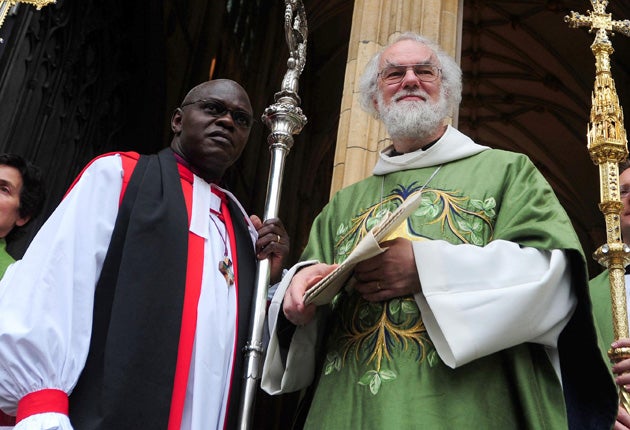Grassroot unrest prompts review of bishops' role
Church of England wards off calls from priests to cut jobs at more senior levels

Your support helps us to tell the story
From reproductive rights to climate change to Big Tech, The Independent is on the ground when the story is developing. Whether it's investigating the financials of Elon Musk's pro-Trump PAC or producing our latest documentary, 'The A Word', which shines a light on the American women fighting for reproductive rights, we know how important it is to parse out the facts from the messaging.
At such a critical moment in US history, we need reporters on the ground. Your donation allows us to keep sending journalists to speak to both sides of the story.
The Independent is trusted by Americans across the entire political spectrum. And unlike many other quality news outlets, we choose not to lock Americans out of our reporting and analysis with paywalls. We believe quality journalism should be available to everyone, paid for by those who can afford it.
Your support makes all the difference.For years it has been the grumble of the vicarage. Why, the grassroots clergy asked, did they have to bear the brunt of cutbacks and redundancies from falling congregations while their bosses, the bishops, remained virtually untouched. Yesterday in York, the Church of England took a first tentative step towards closing that gulf by ordering a review of the bishops' role.
The review is expected to last at least two years but will go some way to addressing concerns among the parishes that senior clergy have yet to accept a fair share of redundancies and cost-cutting measures. Demands for a cut in the numbers of bishops were sidestepped but critics were promised a wide-ranging debate on what should be expected of the diocesan leaders.
Reverend John Hartley, of the diocese of Bradford, led the calls at Synod for the Church of England to do unto senior clergy what it was doing to priests. He was driven by a sense that parish clergy were being treated unfairly and were having to accept a disproportionate number of job losses.
In the last 50 years, Dr Hartley pointed out, the number of stipendiary clergy has been slashed by almost half whereas less than 10 per cent of senior posts had been lost. "I believe that in a situation where we have to make cuts we do have to start by saying cuts have to be made right across the board. You can't say one particular type of clergy is immune," he told The Independent. "It's not just bishops. It's the number of bishops and senior clergy – the managerial layer of the Church."
Dr Hartley accepted that it would be impossible for senior staff to be cut back in exactly the same proportion as lower grade clergy but said measures could be taken to make sure the burden was spread more fairly. To identify how cost cutting could be better managed, he called on Synod to order a report to be completed within three years to provide "a bird's eye view" of how many senior clergy are needed.
"There is a problem that needs to be addressed in the way the Church of England is staffed. Why does it seem that the top end of our Church is resistant to this type of change and reorganisation?" he said at Synod, suggesting that bishops could take on two diocese just as other clergy have to take on multiple parishes.
The Reverend Charles Marnham from London, told Synod: "It's about doing at senior level what we are doing at local parishes. There has been a squeak from the local parishes – they have taken a lot of the pain."
There was, however, recognition by Dr Hartley and his supporters that re-organisations within some diocese have already begun to improve the imbalance – even though from 1990 to 2006 almost all cut-backs were made in parish posts.
Among those opposing the demand was Dr John Saxbee, the Bishop of Lincoln, who said: "The present number of bishops just about delivers the levels of oversight, care and leadership the ministry and mission of the Church requires. If the number is reduced, the capacity to deliver to a standard that clergy, congregations and community are entitled to expect would be compromised."
Despite the refusal to accept that future cuts should be shared equally between parishes and dioceses, there was sympathy for Dr Hartley. Amendments were put forward during a debate to block "the numbers game" but to offer the olive branch of a review.
Wages of virtue
*A newly appointed assistant bishop earns £29,460.
*Suffragen bishops, the next rung up, get £30,440.
*A diocesan bishop, the most senior in a diocese, gets at least £37,320
*The Archbishop of Canterbury gets £69,820.
*Parish clergy start on £19,640.
*The average parish stipend is about £21,500.
*All clergy are provided with homes; senior bishops can live in palaces.
*All clergy can qualify for loans of up to £9,820 to buy a car.
*Bishops get 36 days of annual leave.
Join our commenting forum
Join thought-provoking conversations, follow other Independent readers and see their replies
Comments